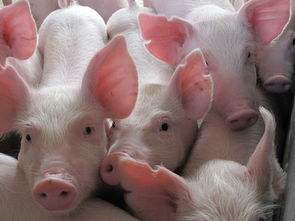(单词翻译:单击)
听力文本
Now, Words and Their Stories from VOA Learning English.
On this program we often talk about the origins of words and expressions that we use in American English. We also talk about how we use them in everyday conversations.
Today we talk about animals--and animals we eat. In English, these two categories often have different names. Pigs turn into pork. Cows turn into beef. Sheep is mutton. Calves are veal. And deer is venison.
But why do we call these animals different names when we prepare them for a meal? Why is it "pig" on the farm but "pork" in a sandwich?

The answer is the Norman Conquest of Britain in 1066. That is when many French words became part of the English language. Many of those French words related to the battlefield, such as "army" and "royal." Many related to government and taxation.
And many others related to food.
When animals were in the stable or on the farm, they kept their Old English names: pig, cow, sheep and calf. But when they were cooked and brought to the table, an English version of the French word was used: pork (porc), beef (beouf), mutton (mouton) and veal (veau).
On several websites, word experts claim that this change shows a class difference between the Anglo-Saxons and the French in Britain at the time of the conquest.
Because the lower-class Anglo-Saxons were the hunters, they used the Old English names for animals. But the upper-class French saw these animals only at mealtimes. So, they used the French word to describe the prepared dishes. Today, modern English speakers — regardless of social class — have come to use both.
The words "deer" and "venison," however, are a bit more complicated.
Etymology Online says "venison" comes from an Old French word from the 1300s (venesoun) meaning "'meat of large game,' especially deer or boar." And that Old French word comes from a Latin word (venation) meaning "a hunt, hunting, or the chase."
Following the Norman Conquest of 1066, any hunted animal was called venison after it was killed. And probably because deer were killed more than any other animal, "venison" came to mean "deer meat."
The words "chicken" and "fish" remain largely unchanged.
However, sometimes we use the word "poultry" when talking about buying a chicken, turkey, or other similar bird to eat. For example, a grocery store may have a place called "the poultry section."
But we don't use "poultry" when we order chicken or turkey at a restaurant, or serve it at a meal. We simply say "chicken" or "turkey."
For example, if I want to order my favorite dish, which is popular in the southern part of the United States, I will say, "I'll have the chicken and waffles, please." I would never order "poultry and waffles."
Lesser common birds, such as quail and pheasant, simply go by their own names.
What about fish?
The French word for "fish" is "poisson." Some word experts suspect that "poisson" is too close to the English word "poison" to become a common food word.
After all, even the food-rich culture of France cannot overcome the fact that eating poison might kill you or at least make you sick. As a result, anything that even sounds like "poison" will probably be an unpopular choice at mealtimes.
And that bring us to the end of another Words and Their Stories.
In your language, do the words for animals change when you eat them? Let us know in the Comments Section!
Thanks for joining us. I'm Anna Matteo.
重点解析
1.turn into 变成
We think he'll turn into a top-class player.
我们认为他会成为一流的选手。
2.relate to 有关联;与……有关;理解
All these questions relate to philosophy.
这些问题都跟哲学有关。
3.prepare for 准备;为……作准备;为……做准备
It's your responsibility, and you are not prepare for this.
这是你的责任,你没有准备好。
参考译文
现在是VOA学英语《词汇掌故》时间。
这个节目会经常探讨美式英语里一些单词和表达的来源,也会探讨它们在日常交际中的用法。
今天我们就来聊一聊动物——以及我们食用的动物,英语里这两种类别的动物通常会有不同的叫法:“猪(pigs)”会变成“猪肉(pork)”、“牛(cows)”会变成“牛肉(beef)”、“羊(sheep)”会变成“羊肉(mutton)”、“牛犊(calves)”会变成“小牛肉(veal)”、“鹿(deer)”会变成“鹿肉(venison)”。
但是,为什么当我们把这些动物做成大餐的时候就要换一种方式称呼它们呢?为什么农场里的猪叫“pig”而三明治里的猪叫“pork”呢?
答案来源于1066年的“诺曼征服英国”,就是在那时英语接收了很多的法语单词,其中有很多和战场相关,比如“军队(army)”和“王室(royal)”;还有一些和“政府(government)”、“税收(taxation)”相关;
还有许多和“食物(food)”相关。
圈养的动物或者农场里的动物保留其古英语的称呼:pig(猪)、cow(牛)、sheep(羊)、calf(小牛)。但是当这些动物们被烹饪并变成佳肴上到餐桌上时,英语版的法语单词便派上了用场:猪肉(porc)、牛肉(beouf)、羊肉(mouton)、小牛肉(veau)。
在几家网站上,有一些文字学专家认为这个变化正显露出征服期间英国人和法国人之间的阶级差异。
因为较低等级的英国人是猎人,他们用古英语称呼动物。但是上流社会的法国人只在就餐时能看见这些动物,所以他们用法语来称呼这些被做成美食的动物。而现如今说英语的人,不论社会等级,这两种名称都会使用。
但是单词“deer(鹿)”和“venison(鹿肉)”的来源稍微有点复杂。
词源网站上显示“venison”来源于13世纪时的一个古法语单词(venesoun),其意思是“用于大型比赛的肉,尤指鹿或野猪的肉”,而该法语单词又来源于一个意大利单词“venation”,意思是“狩猎或者追捕”。
1066年诺尔曼人征服英国之后,任何被猎到的动物在宰杀之后都被称为“venison”,或许是因为猎杀到的鹿比其他种类的动物要多,所以“venison”便被用来表示“鹿肉”。
单词“chicken(鸡/鸡肉)”和“fish(鱼/鱼肉)”,其表示“肉”的意思的单词本身没多大变化。
有时当我们谈论”买鸡、火鸡或者类似的禽类动物肉来吃”的时候会用到单词“poultry(禽肉)”,比如可能会在食品杂货店出现的“禽肉区”。
但是,当我们在餐馆里点餐点到鸡肉、火鸡肉或者在餐桌上享用它们的时候,我们不称它们为“禽肉(poultry)”,只称“chicken”或者“turkey”。
比如,我想点一道我最爱的在美国南部很受欢迎的菜,我会说:“给我来份chicken(鸡肉)和华夫饼。”我肯定不会点一份“poultry(禽肉)”和华夫饼的。
不太常见的禽类,比如鹌鹑和野鸡,它们“肉类”的表达没有变化。
那fish(鱼肉)呢?
法语里表示“鱼肉”的单词是“poisson”,一些文字学专家认为“poisson”和英语单词“poison(毒药)”太像了,所以不能用来给一般的食物命名。
毕竟,即使是食物文化丰富的法国也无法改变吃有毒食物会死人或是让人生病这个事实。所以说不管什么食物,即使只是发音和“poison(毒物)”相似,在就餐时都不会是受欢迎的选择。
又到《词汇掌故》节目的尾声了。
在你们的语言里动物的称呼和其成为食物时的称呼会发生变化吗?在评论区给我们留言吧!
谢谢参与,我是安娜·马特奥。


